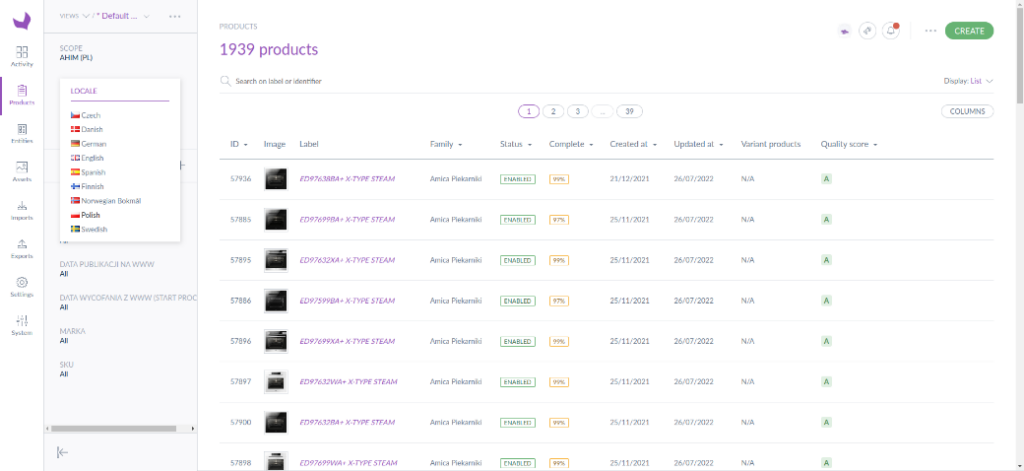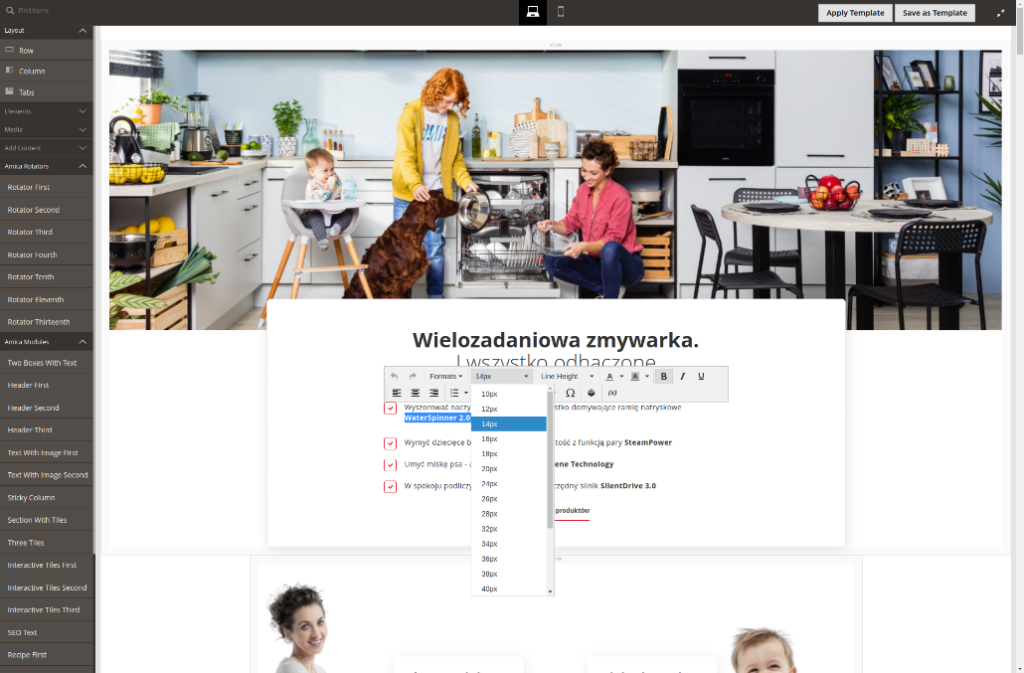Implementation of Akeneo PIM, Adobe Commerce store and extended CMS for Amica

Challenge
Amica SA is the largest Polish manufacturer of household appliances. It has existed since 1945. It offers a full range of intelligent large and small household appliances, distinguished by the latest technology and modern design. Forty overseas markets generate more than 70 per cent of the profits.
The company wanted to create a modern website, enabling an attractive presentation of the offer. It was essential to provide users visiting the website with additional information about products and possible online purchases of selected accessories and supplementary offers. Amica is also expected to implement an advanced, intuitive product comparison engine – crucial in household appliances

To implement this project and the next ones with product data, it was necessary to develop an architecture that would allow the centralization and unification of processes related to data management. Amica also faced the choice of an appropriate PIM class system.
In connection with these plans, Amica turned to Exorigo-Upos – as the official technological partner of Adobe and Akeneo, i.e. providers of top e-commerce solutions.
Solution
The design work began with the approval of the future systems. Then the project team established the order in which the implementations would occur. Exorigo-Upos, as a technology partner, wanted to be sure at this stage that all Amica’s business needs had been identified – so that the selected solutions would undoubtedly address them.
The starting point was the MVP for Akeneo PIM because it was crucial to collect product data from the essential systems and verify it. It was also necessary to unify product information to PIM models – this step had to occur before launching subsequent projects.
The target implementation of the PIM system was a challenge. It was successful only thanks to the enormous commitment of the project team on Amica’s side and Exorigo-Upos’ experience in implementing such projects.
The scale of the implementation is best illustrated by its elements:
- Development of a universal data model for the entire Amica group.
- Taking into account 2,500 attributes.
- Standardizing and preparing a standard data management process for nine markets and languages.
- The creation of over 3,000 automatic rules for data mapping.
In addition, the Amica team developed and built interfaces from the internal system to Akeneo. It was a significant challenge to the data’s complexity and diversity.

Implementing a global product data management solution – PIM Akeneo, was a key challenge for us, as it was the foundation for further planned implementations in the Digital area. The project was a massive challenge from the beginning because PIM Akeneo had to combine not only different systems but also very different areas behind them, and thus – the production area describes materials differently than marketing and sales. Thanks to the vast support and experience of the Exorigo-Upos team dedicated to this project and the commitment of the entire project team on Amica’s side, we managed to achieve the assumed goals together. Today PIM Akeneo is the primary source of comprehensive product information for subsequent markets in the Amica Group. Currently, Akeneo is producing websites in 3 markets for three different brands and supports data in 4 languages. It is also a source for sales support systems and digital agencies cooperating with Amica Group. We are planning development with new brands, markets, and further integrations.
Piotr Zieliński, Sales Digitalization Vice Director – Amica
The next project, carried out in the established order, was implementing the Adobe Commerce platform. The E-commerce team at Exorigo-Upos focused on the technological layer and the GoldenGrid agency in the website’s UX and graphic design. Both companies have several jointly implemented and, let us add, successful websites. The competencies of both teams complement each other perfectly, and team members have already developed a practical path of cooperation. It was crucial for the implementation of projects on time and with the expected quality.
The choice of the Adobe platform was preceded by a several-month process of evaluating various global e-commerce solutions. Ultimately, we decided on the Adobe Commerce Cloud solution, which provides us with great flexibility in building product websites and stores. The technology we have chosen has a lot of standard functionality, enabling a comprehensive presentation of product information, an intuitive search engine, and an advanced product comparison engine, which is crucial in our industry. Working with the GoldenGrid team on the graphic layer, we appreciated Adobe’s technological adaptation to the “mobile first” idea, which was one of the project’s assumptions. It is also impossible to mention the number of integrations of our platform, which, together with a team of analysts, architects, and, above all, programmers, we implemented pretty efficiently by connecting Adobe with the systems of SAP, payment operators, or courier companies. We are already using the experience of building the first such advanced website to implement new ones for other Amica Group brands.
Robert Drożyński, Project Leader responsible in the Amica Group for building and implementing the e-Commerce strategy
As a technological platform, Exorigo-Upos recommended the latest version of Adobe Commerce Cloud (Magento) 2.4. It has been integrated primarily with the Akeneo PIM system implemented in the first place. In addition, we ensure data exchange with SAP ERP, SAP CRM, several other Amica solutions, and the logistics operator Hellmann.
A particular challenge in the project was to prepare a set of dedicated CMS components. They allow Amica business users to configure website elements, such as landing pages, independently. We achieved this goal by implementing several extensions to the Magento Page Builder module. It is worth emphasizing that this is the most extensive implementation of the Adobe platform carried out by Exorigo-Upos so far in terms of CMS development.

Designing interfaces and UX for the entire e-commerce environment was a unique task for the GoldenGrid design team. On the one hand, we had a lot of quantitative and qualitative data that made it easier for us to create an effective Amica sales platform. On the other hand, we had to adapt the information architecture and process mapping, considering all technological possibilities and limitations. And all this so that the created components can be flexibly used to independently develop new subpages on the Amica.pl website and, at the same time, other e-commerce websites for different markets.
It was a demanding task. A team of a dozen people spent hours analyzing and modelling qualitative and quantitative data. As a result, hundreds of designed interfaces adapted to mobile devices and desktops led to the creation of a project dedicated to many European markets.
Rafał Niemczynowicz, Head of UX – GoldenGrid
From the user experience side, we prepared an intuitive search engine and an advanced comparison engine for the store’s customers. Amica was particularly interested in these two functionalities. In addition, we refined the entire shopping path in terms of convenience and design by GoldenGrid and in terms of correctness and speed of operation by the Exorigo-Upos development team. The customers of the store gained pervasive information about the products: specifications, opinions, downloads, as well as inspirations and suggested additional products. The whole thing is available both in the desktop version and in the version for mobile devices.
Amica’s decision to choose us as the supplier of two solutions critical for the functioning of e-commerce, i.e. the Adobe Commerce platform and the tool for managing product information – Akeneo PIM, is proof of great trust for us. The project of implementing both systems was quite a challenge – the experience and competence of my team, as well as the client’s open attitude and significant commitment, were crucial. Together with Amica, we implemented the PIM system, and then with GoldenGrid, we created a new store, of which we are very proud. Our efforts will now be appreciated by customers who will be happy to make purchases there.
Przemysław Łukaszewski, E-commerce Business Unit Director – Exorigo-Upos
Akeneo PIM implementations and Adobe Commerce (Magento) have been scheduled sequentially and in optimal order. It started with organizing product information, and only in the next step a new website was created, which was fed with this data.
Result
The implementation of the Akeneo PIM system provided Amica with appropriate technological support for business development. It enabled faster and more effective implementation of other solutions, particularly in the area of e-commerce, but also paved the way for efficient launching of sales on new markets and various brands.

The work done by Exorigo-Upos also met Amic’s expectation that the system should be scalable. Thanks to the implementation, you can easily share product data with any sales or marketing channel – particularly, it allows for quick time-to-market.
Product information management throughout the Group has improved in quality – through, e.g. increasing the accuracy of data and improving internal work – thanks to shortening the time needed to prepare, verify and publish data. Automating tasks using the Akeneo rule engine also initiated a new process of technical mapping data to functional descriptions and features prepared by the Marketing Department.
In the case of Adobe Commerce, the new solution turned out to be very convenient for both the store’s customers and Amica employees. A common platform for content management and e-commerce sales has been prepared so that it can be used to develop websites for other companies and brands within the Amica Group. In this way, after the Polish go-live version, domains for Fagor – one of Amica’s brands – were launched, first for the Czech market and then for the Spanish one.
Today, Amica uses the two best technological solutions in e-commerce and can quickly launch online sales in other markets. The company’s customers can visit the brand’s website at any time, get to know the details of the products, and make better purchasing decisions. Employees gained solutions that improved their daily work on product information and the website’s appearance.

